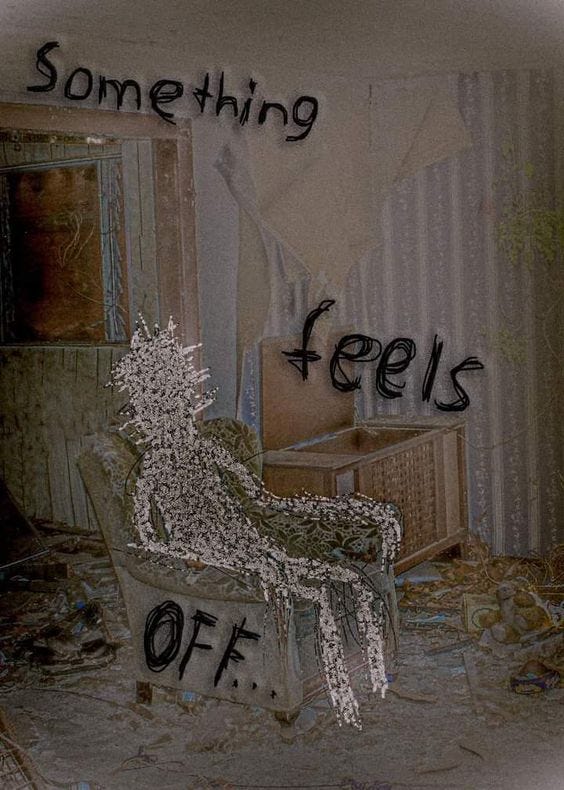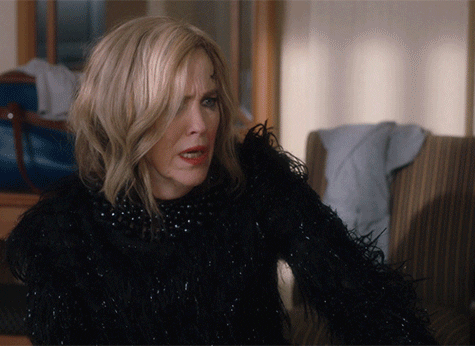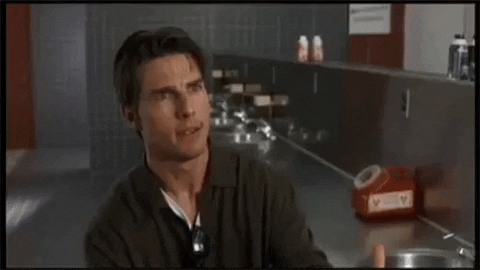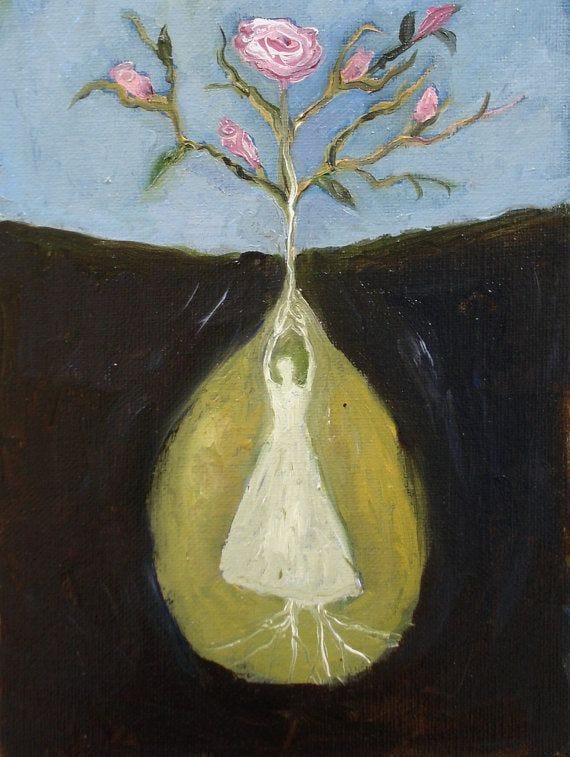beating the shit out of myself with self-care. 👼
how I learned that getting out of your head and into your body is similar to never skipping leg day
If I’ve learned anything over the last few weeks, it’s that I can turn just about anything “good” for me into just another way of beating myself up.
Hydrating and feeding myself, movement through exercise, reading books, and even mindful moments of silence have become opportunities for me to put my body and mind through the metaphorical ringer.
Nothing is ever good enough. It feels like there’s an invisible bar that I can never hit.
The result? I neglect self-care entirely.
Much to my husband’s confusion and dismay, I’ll sit at my desk for hours at a time without eating or drinking, only to become a hangry and reactive monster once I finally do wake up from my dissociative over-working stupor.
I dread - and actively HATE - “working out.” It feels like a chore. It always has. I psych myself out as soon as I start most kinds of physical activity because I’m not “fit enough.” My body just doesn’t seem to be doing what I want it to do.
What I can do is sit down at my laptop, work my ass off, and keep my head firmly in the intellectual clouds. Smushing as much knowledge into my brain as possible. So that’s what I do.
My body is not pleased about this arrangement, and she sure as hell lets me know about it in a variety of ways (chronic pain, autoimmune issues, brain fog, extreme emotion dysregulation, etc.)
The basic tasks of caring for and nourishing my body have become methods of punishment. No wonder I find myself putting them off. I’m removing any sense of sensory pleasure from the equation. Waking up to this realization this week was a pretty major epiphany for me.
The way I’m approaching my “body admin” (the fact that I even call it “body admin” tells you a lot about how deep the disconnect between my mind and body has truly become) recently called to mind a scene from the 2006 movie The Da Vinci Code.
In this scene (which is pretty brutal, so click the YouTube link at your own peril), Silas (incredible actor Paul Bettany) flagellates himself in humility during prayer.
I thought to myself: This is how I treat my relationship with my body. This is a problem. I also thought: Surely I’m not the only one approaching the care of my body in this brutal and self-punishing way.
As listeners of the podcast know, especially my Premium Submarines (Patreon members who receive additional private content), I’ve recently begun working with a therapist who specializes in bodywork and Somatic Experiencing.
I know that splits in the psyche are a big problem. The “splits” in the Self are a major cause of psychological suffering. I’ve dedicated a massive amount of time to reading on this, and it’s the comprehension and deeper awareness of these concepts that have shed light on the origins of my coping mechanisms and the reverberating impact of the trauma, sexual abuse, and grooming I experienced as a child and teenager.
This deeper mental understanding led to the healing of many of my psychological splits. This awareness has been priceless. But here’s the thing: my symptoms remained.
I still felt like a cornered animal who wasn’t able to care for herself or meet her own basic needs, I was just more acutely aware of how fucked up I was.
Why? Because there were still splits left that I wasn’t even conscious of. Those remaining splits lived in the deep disconnection between my body and my mind.
Dipping my toe into the waters of trauma-informed care and Somatic Experiencing has helped me understand that I had been dedicating all of my energy towards healing only part of myself (my mind.) I was leaving the other part (my body) entirely in the dust. My body was not pleased about this, and she was letting me know about it.
Bessel Van Der Kolk really wasn’t lying when he said, “the body keeps the score.” Boy, does she ever.
Intellectually, I knew that the pursuit of psychological wholeness and integration was all about balance.
What the fuck did I think would happen if I poured all of my time and energy into beefing up my brain with all of this recovery jargon and depth psychology while completely neglecting the embodiment piece?
It’s like the dudes you see walking around that you just know skip leg day.
You know the type: big rippling arm and chest muscles with little spindly pins that look like they can barely withstand the weight of the upper half. It’s obvious to everyone else but the dude himself: there’s an imbalance there; he just doesn’t want to see it.
In this bizarre analogy (stay with me here), my mind will represent the arms of our leg-day-skipping Chad. My body, lost and forgotten, are his tiny little spaghetti legs.
Just as Chad is setting himself up for future muscular imbalance, joint problems, reduced mobility, and potential injury by neglecting to strengthen his bottom half, I was in a similar position: my body was literally screaming at me to provide it with basic time, attention, and care.
OH, GOD. AM I A LEG-DAY-SKIPPING CHAD IN THE DEEPEST RECESSES OF MY SOUL?
The trauma and self-care connection
It might surprise you to learn that the way we approach self-care is deeply influenced by our past experiences, particularly those related to trauma.
Trauma (both the Big T and Little T kinds) can have lasting effects on how we perceive and engage with the world, including our own bodies.
Engaging in self-punishing behaviors, like pushing ourselves to work out excessively, taking part in extreme dieting, or neglecting basic needs like eating and drinking, all might be coping mechanisms developed in response to past trauma.
HYPERFOCUS ON CONTROL
Traumatic experiences can leave us feeling overwhelmed and powerless. In response, we might develop hyper-focus on controlling certain aspects of our lives, like our bodies or our food intake.
By strictly regulating our own eating and drinking habits, we might experience a temporary feeling of control in what we feel is a chaotic and unpredictable world.
Those of us who are survivors of trauma or abuse need to understand that viewing the world and other people in this way was self-protective and adaptive at the time. We needed to feel a sense of control to manufacture even the smallest sense of safety.
But as the consequences of this type of self-abandonment and punishment pile up, our bodies fight back in the form of the development of symptoms and later, dis-ease.
For more on this, check out this article where Gabor Maté explains how stress and neglect of our own needs can eventually manifest as physical illness.
ASSOCIATING VULNERABILITY WITH HARM
Traumatic experiences in childhood and adolescence can also deeply engrain in us a dangerous association: vulnerability = harm.
In a traumatic environment, we may have learned to associate being vulnerable or needing help with harm or betrayal. Far too many times, the act of stating our needs and feelings was met with outright dismissal, shaming, or disgust.
As a result, we may have learned that being in a position of having needs of our own or seeking out nurturing is something to be actively avoided, even if it means neglecting basic self-care entirely.
DISTORTED SELF-PERCEPTION
It’s no secret that traumatic experiences lead to the development of distorted and unrealistic beliefs about ourselves, other people, and the world around us. It’s almost like we develop a special “survivors veil.”
I’ve often wondered what it must be like for people who experienced a “normal” and natural development of their sexual unfolding rather than having it ripped from them and turned into something poisonous, abusive, and full of coercive control.
“Must be nice,” I’d often think, “they’ll learn how the world *really* is eventually.”
I now realize that that was the “survivor’s veil” talking. Not everyone has been traumatized and abused, and there are many people who see the world as a relatively safe place full of people who are genuinely doing their best, and that’s actually a more realistic interpretation, as hard as it is for my traumatized brain to comprehend and accept.
As survivors of trauma and abuse, we might internalize these negative messages, truly believing that we are unworthy or undeserving of basic care and nourishment. This can lead us to neglect our own needs as a way to subconsciously validate and honor the “survivor’s veil.”
I realize now that this veil protected me at some point, but it is now becoming stifling and is the very barrier standing between me and true conscious embodiment.
EMOTIONAL NUMBING
Certain experiences of trauma can be so painful that the only choice we have is to leave our bodies. Often, these types of reactions are experienced as dissociation, derealization, or depersonalization.
Essentially, we feel like we are detached from our body or mental processes. It’s like being an outside observer of your own life, and it’s really fucking scary.
If you’d like to learn more about dissociative experiences, I did a deep dive on my podcast about exactly this. You can check it out here.
The overwhelm and resulting detachment experiences can also cause emotional numbing, which can result in us becoming disconnected from our body signals of hunger or thirst, making it much easier to ignore these needs. Much to the confusion of the more securely attached and un-traumatized people in our adult lives, who watch us engaging in this behavior from a concerned and helpless-feeling distance.
WHEN WHAT WAS ADAPTIVE NO LONGER IS
Waking up to the gravity of my own self-punishment and self-deprivation has been difficult and painful, to say the very least.
I’ve had to constantly remind myself that these behaviors were adaptive responses to cope with overwhelming and threatening situations, and at the time, they provided me with a much-needed sense of control and safety.
If your experience is similar, I encourage you to offer yourself a similar amount of grace and understanding. We can’t afford to beat ourselves up even more than we already have, now can we?
What we need now more than anything is a compassionate and non-judgmental approach.
A huge part of my recovery has been recognizing and daring to look at behaviors and ways of thinking that no longer serve me. Working with a trauma-informed practitioner certified in Somatic Experiencing has been impactful and transformative in a way that talk therapy never was. It bridges that gap between mind and body that I was starving for but never knew I needed.
Through working with my therapist and through deep self-reflection, I am exploring my patterns, processing and metabolizing past experiences and developing healthier coping and self-soothing strategies that help me address my own unmet needs.
I’m becoming my own compassionate Mother. I’m trying to learn not to see all of this as a slow and painstaking battle towards some invisible finish line but rather a metamorphosis and unfolding that I can’t rush.
I’m trying my best to savor the journey. It’s a complete mental shift for me, and it’s really, really difficult. But still, I push forward.
THE PHILOSOPHER’S STONE
Swiss psychologist and psychoanalyst Carl Gustav Jung once said something pretty powerful:
“Until you make the unconscious conscious, it will direct your life, and you will call it fate.”
This quote refers to Jung’s concept of the “shadow.” Our shadow is an unconscious part of our personality that consists of repressed weaknesses, desires, instincts, and unresolved trauma and conflicts.
Although the shadow is completely hidden from our conscious mind, it’s working like hell in the background, influencing much of our behavior and emotions.
The thing about bringing light into the darkness is that once you do, it’s not so scary anymore. Things are clear. You can see into the messy mucky corners that felt unreachable previously.
The scary part about all of this that I’ve had to come face-to-face with is that no one’s coming to save me or to do this work for me. This is my journey.
I will no longer allow my maladaptive patterns of behavior, emotional reactions, and traumatic experiences to dictate the outcomes of my life.
And if leaning a little further into taking care of myself is part of that journey? Maybe I can at least start giving myself permission to make it as pleasurable as possible.
Maybe, just maybe, I can allow taking care of myself to feel good. Maybe I deserve to feel good. What a novel concept.
𓆩ᥫ᭡𓆪 Molls














My problem is I will put all my time and effort into working. Then it comes around to the weekend and I have no hobby or nothing that fulfills me or my energy. Then I feel the big empty and start ruminating on how I hate myself because I don’t have any hobbies and I just feel the big empty every weekend.
Going to the gym helped with this. It gives me a hobby out of the house. Seeing the changes in my strength helps with my confidence. However whenever I feel depressed I will stop going to the gym. Then I’ll repeat the pattern 😭
I’m currently trying to psych myself up to go to the gym again. I haven’t been in so long I always dread going back. I know once I’m there it helps, it’s just hard getting there.
I sooooooo relate to this, Mollie!!! Filling my bookshelves (and brain) are multiple books on yoga for healing trauma, "The Body Keeps the Score", "The Mindful Way Through Depression", MANY books on metta meditation and mindful self-compassion practices, books on Acceptance & Commitment Therapy, several books by Peter Levine, books on 5Rhythms dance, and on and on... I could write a book about these books, about these amazingly effective treatment modalities, and yet, I fail to practice them consistently. I did, for a time, and doing so saved my life. Then I met my partner, (now ex-partner), and started drinking heavily, and let all my self-care practices go. For 6.5 years now, I have thought about and talked about these things, yet not practiced them...but continued to stay in my head entirely, as my body began to cry out to me, with aches and pains and stiffness...even clots in my lungs, which I have no risk factors for, according to mainstream medicine, but which some studies have shown are more common in women with trauma in their history. Anyway, I SO feel you on this. And I look forward to changing, along with you!